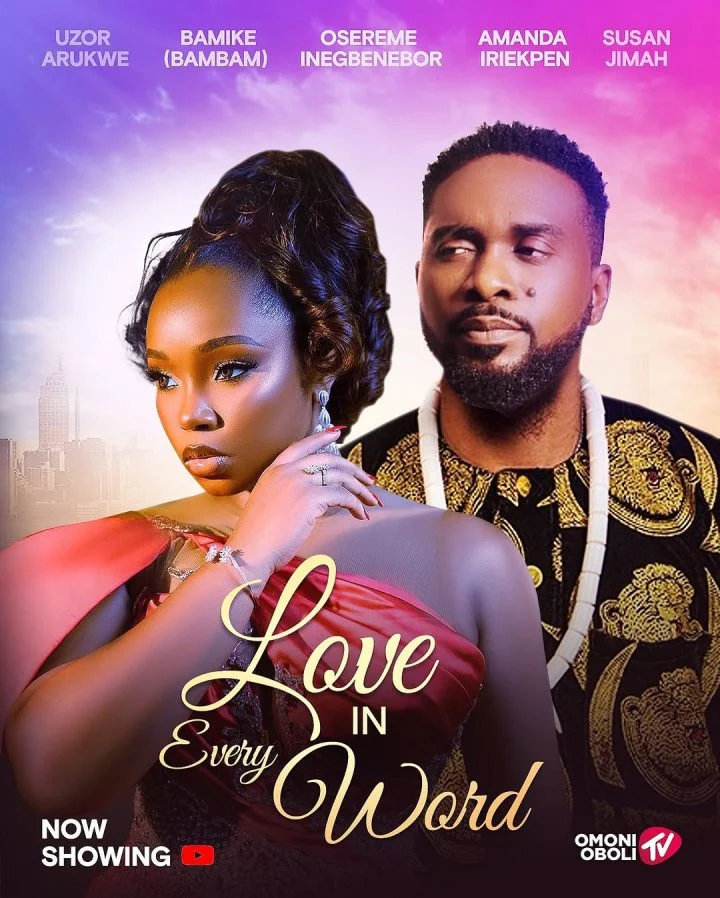Stanley Obi’s Love in Every Word is more than just a romantic drama. It’s a reflection of Nollywood’s ongoing preoccupation with power, wealth, and the myth of the all-knowing, all-conquering man. Since its release on Omoni Oboli’s YouTube channel, the film has drawn millions of views and sparked conversations, but one figure has emerged as its gravitational center: Obiora, the ‘Odogwu’ archetype. Played by Uzor Arukwe, Obiora is not merely a love interest; he is a manifestation of a well-worn Nollywood trope—an emblem of masculinity that audiences have come to revere, even when it upholds a fragile, sometimes troubling, vision of male authority.
Odogwu, in Igbo parlance, is a title bestowed upon a man of means and influence. It signifies strength, a near-mythic ability to command respect, and, crucially, a financial status that dictates the course of events. In Love in Every Word, Obiora embodies these traits almost to a fault. He is rich, persistent, and ultimately successful in bending the plot—along with Chioma’s initial resistance—to his will. The film does not necessarily frame his actions as manipulative, yet the audience’s reception suggests a glorification of his dogged pursuit. The cultural script at play is familiar: when a man of means insists long enough, his desires are bound to materialize. But what does this say about the way Nollywood continues to shape perceptions of love and power?
Obiora’s characterization is part of a larger pattern within mainstream Nollywood storytelling. The industry has long been fascinated with the figure of the wealthy, benevolent male, whose affluence grants him a moral high ground. Films such as Chief Daddy and Living in Bondage: Breaking Free explore variations of this theme, reinforcing the idea that financial success is the ultimate measure of a man’s worth. In Love in Every Word, Obiora’s wealth is not just an asset—it is the narrative’s fulcrum. Without it, his persistence might read differently. His ability to weather Chioma’s rejection is directly tied to his economic stability. Where a less affluent man might have been dismissed as overbearing, Obiora is framed as patient, his pursuit romanticized by his purchasing power.
This raises a broader question about Nollywood’s relationship with masculinity and agency. If wealth is the ultimate redeeming quality, where does that leave the nuance of character development? Can love be separated from financial transactions in a cultural space where economic struggles are pervasive? The film, like many before it, does not attempt to untangle these complexities. Instead, it leans into them, reflecting a reality that audiences recognize and, in some cases, admire.
The audience’s enthusiastic embrace of Obiora is telling. Social media reactions frame him as the ideal suitor—‘Odogwu’ in full form. But this fascination with dominance, financial leverage, and emotional persistence mirrors broader societal expectations placed on men. It’s an illusion of strength, one that conflates material wealth with emotional intelligence, ambition with entitlement. As mainstream Nollywood continues to cater to escapist fantasies, the Odogwu archetype thrives, feeding a narrative that equates power with desirability.
But does this serve the evolution of Nigerian cinema? As the industry seeks global legitimacy and creative depth, its reliance on these well-worn tropes may be more of a hindrance than an asset. The question, then, is not whether the Odogwu character will endure—he certainly will—but whether Nollywood is willing to challenge him, to deconstruct the fantasy and explore what lies beneath the illusion of strength.


